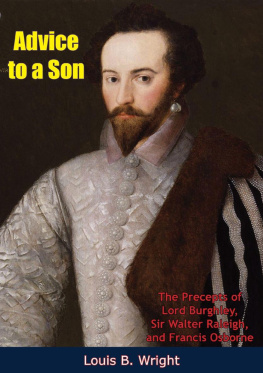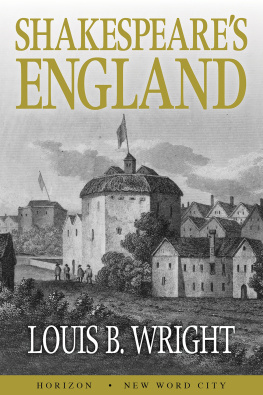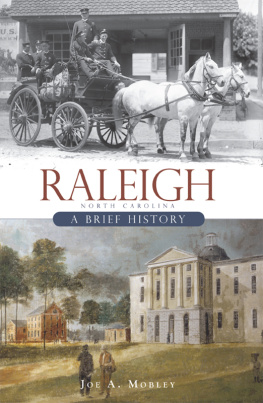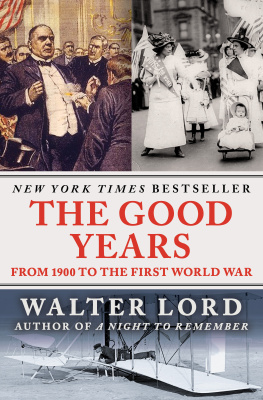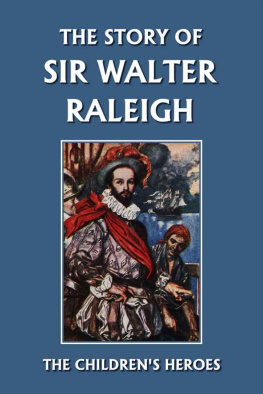This edition is published by BORODINO BOOKS www.pp-publishing.com
To join our mailing list for new titles or for issues with our books borodinobooks@gmail.com
Or on Facebook
Text originally published in 1962 under the same title.
Borodino Books 2018, all rights reserved. No part of this publication may be reproduced, stored in a retrieval system or transmitted by any means, electrical, mechanical or otherwise without the written permission of the copyright holder.
Publishers Note
Although in most cases we have retained the Authors original spelling and grammar to authentically reproduce the work of the Author and the original intent of such material, some additional notes and clarifications have been added for the modern readers benefit.
We have also made every effort to include all maps and illustrations of the original edition the limitations of formatting do not allow of including larger maps, we will upload as many of these maps as possible.
ADVICE TO A SON
PRECEPTS OF LORD BURGHLEY,
SIR WALTER RALEIGH
AND FRANCIS OSBORNE
EDITED BY
LOUIS B. WRIGHT
PREFACE
IN PRINTING the texts of the advice that William Cecil Lord Burghley, Sir Walter Raleigh, and Francis Osborne saw fit to compile for their sons, we have sought to present versions that are accurate and readable. As with other texts in the Folger Documents of Tudor and Stuart Civilization, we have tried to keep the documentation to the minimum needed for the comprehension of the documents. Readable texts, rather than critical editions identifying every allusion and source of ideas, are our aim.
To that end we have modernized spelling, punctuation, and capitalization, but we have of course retained all obsolete words and we have not meddled with the authors grammar. It has seemed best to retain the exact spelling of all foreign language passages, including Latin quotations, because they illustrate the authors understanding and usage.
For making the transcriptions of these works I am indebted to Miss Ellen Eyler of the Folger editorial staff. She has been of immense help in the preparation of this edition. I wish also to thank officials of the British Museum for making available a photographic copy of Burghleys A Memorial for Thomas Cecil. In this text, as in many others, the keen eye of Miss Virginia LaMar, chief editorial assistant, has saved us from many errors.
L. B. W.
Folger Library
June 24, 1961
INTRODUCTION
THE evolution of a literary type which culminated in the eighteenth century in Lord Chesterfields Letters to His Son is illustrated by three famous sets of precepts reprinted here. {1} The literary genre of Advice to a Son, and sometimes Advice to a Daughter, enjoyed a considerable popularity in the late seventeenth and early eighteenth centuries, but it had its origin in earlier and somewhat different kinds of instruction. Sometimes the later types of Advice were merely generalized essays on manners and morals or devices for satirical or facetious commentary. Earlier Advices, however, like those attributed to Burghley and Raleigh, frequently represented efforts toward the indoctrination of definite individuals. Because of the fame of the compiler or the quality of the advice, some of these precepts found their way into print to serve as guides and admonishment to the general public. Thus, they illustrate an ideal of manners and behavior and serve as an index to what fathers of the period might wish to see demonstrated in the conduct of their children.
Guides to conduct are common to all ages, for writers never cease to believe that the distillation of their wisdom will in some fashion improve the behavior of youth and provide useful instruction to their elders. The sixteenth century was a particularly didactic age and had more than its share of self-appointed instructors with faith in their missions. {2} The treatise of instruction might take the form of a sermon by some contemporary preacher, a translation of some book of wisdom from the ancients, a courtesy book taken from the Italians, an original work designed to guide the education of the prince, or a few pious and practical admonitions of a parent to a son or a daughter.
The most famous and most popular guide to behavior in the sixteenth century was Sir Thomas Elyots Book Named the Governor, first published in 1531 with at least eight editions by 1580. Elyots work is a comprehensive discussion of the best way to educate a youth who will have responsibilities in the state, and it provides much incidental information about the state of learning as well as behavior in this period. At the end of the century James VI of Scotland, later James I of England, published Basilikon Doron, or His Majestys Instructions to His Dearest Son, Henry the Prince (1599), which by 1604 also had at least eight editions. Sir Walter Scott declared that Basilikon Doron exhibits that extraordinary mixture of learning and pedantry, sense and folly, reason and prejudice, vanity and prudence, which most deservedly procured James the character of the wisest fool in Christendom. {3} At any rate, these two works, of Elyot and King James, are characteristic of the didactic treatises and represent what the sixteenth century believed essential in the education of aristocratic youths. Works designed for folk of less exalted station also abounded, and many devotional books not only pointed the way to heaven but also provided both pious and practical instruction for making a success of ones present life. {4}
The sixteenth century devoured instruction of all sorts and was particularly addicted to sermons and pious exhortations, whether by ordained preachers or laymen. An age in which more than 43 per cent of the output of the printing press consisted of pious and religious works saw nothing unusual in a man of the world as practical as Burghley prescribing a religious regimen for his household that would have done credit to a monastery. That is not to say that all members of the household adhered to the rules with fidelity, but it is significant that in Burghleys household, as in many others, there was an extraordinary emphasis on religious instruction along with more pragmatic training. We must not discount the sincerity of such people or regard them as members of a particularly pious branch of a Puritan sect. In this period even callous ship captains and buccaneers prescribed religious exercises in their voyages and carried chaplains to see that crews kept their swearing in compass and did not stray too far from the paths of rectitude. {5} Though they might regard this precaution as a sort of insurance against disaster, they had no doubt of its spiritual value.
In typical manuals of advice religious instruction and religious admonitions were mingled with eminently practical and even worldly counsel on ways to succeed in a world that was anything but ideal. Sophisticates of later ages have laughed at this mixture in Burghleys Precepts as they have laughed at the materialistic advice that Polonius gave to Laertes, but they forget that both Burghley and Polonius were realists familiar with a struggle for position and power that was cruel and ruthless. Rarely in politics does one encounter nice distinctions of ethics, and the courts of the Tudors and the Stuarts were no exceptions. Calculated scheming, sharp practice, the heartless elimination of competition by whatever means seemed safest, and sheer luck helped to account for the rise of many a great man to whom the populace showed honor, A practical father who wished his own son to get ahead in that world would not want him to grow up either tender-minded or ignorant of realities. He would also hope that the youth might enjoy the favor of the Almighty, for no one expected preferment without the intercession of some great person, and the Elizabethan looked to heaven for the happiest intercession of all. Prayer was not without purpose here and hereafter.


